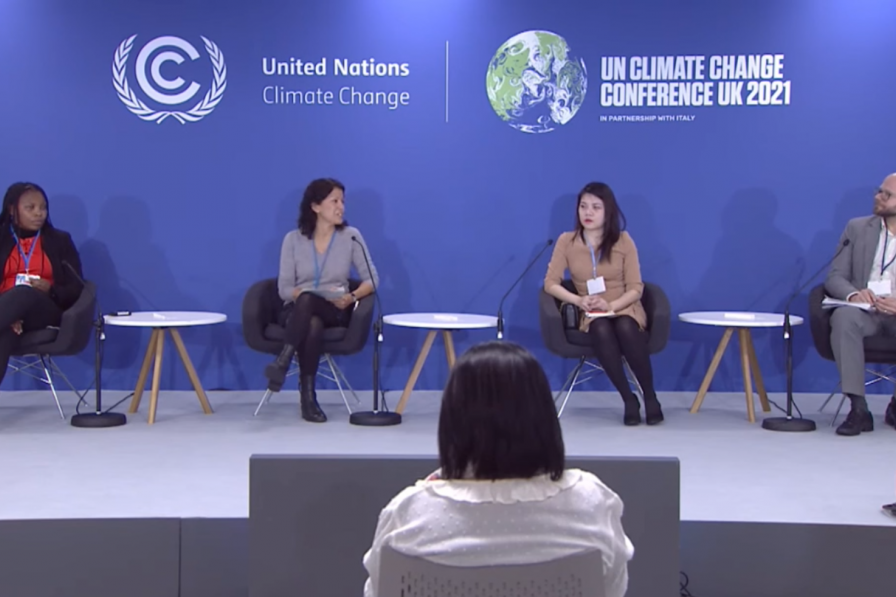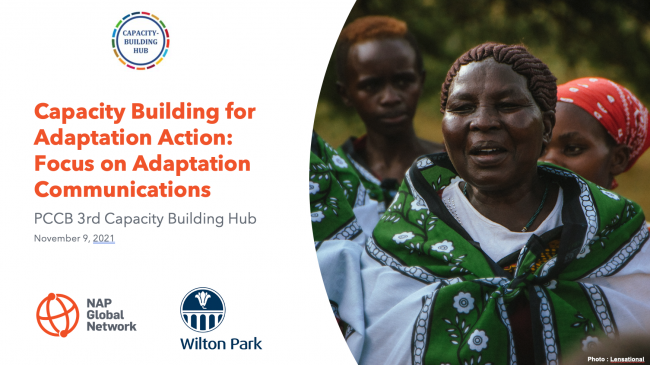Capacity Building for Adaptation Action: Focus on Adaptation Communications
Ensuring capacity is delivered in a sustained manner that encourages capacity retention over the long term is critical. Currently, it is often delivered in a sporadic and fragmented manner. With respect to capacity building for adaptation action, in particular, this event brought together representatives to discuss ways of communicating progress made by countries in developing National Adaptation Plans (NAPs). Two specific countries were invited to share their adaptation communication (ADCOM) experiences, namely Viet Nam and eSwatini. Key messages from the event included:
- ADCOMs should strengthen national adaptation planning, implementation, and monitoring processes;
- capacity building should include all levels and sectors, particularly the most vulnerable sectors of society, and ensure all voices are heard; and
- integration across key national sectors and ensuring efficient synergies between national and global adaptation processes must be built into capacity-building efforts.
This event was held at the 3rd Capacity-Building Hub, which is hosted by the Paris Committee on Capacity Building. It was organized by the NAP Global Network, whose Secretariat is hosted by the International Institute for Sustainable Development (IISD), with funding support from the UK Government through the United Kingdom's Foreign, Commonwealth and Development Office (FCDO).
Highlighting the need for countries to use ADCOMs to raise the profile and visibility of adaptation, Claire Holzer Fleming, who is negotiating for the UK on capacity-building issues at COP 26, applauded the set of substantial actions and recommendations developed by the COP26 Catalyst for Climate Action Group to support national ADCOM development.
Anne Hammill, Senior Director, Resilience Program, IISD, and NAP Global Network Secretariat, moderated the side event. She said the goal of ADCOMs is to enhance national adaptation planning and actions in developing countries through:
- supporting national-level action on NAP development and implementation;
- helping countries learn from each other through South-South peer learning and exchanges; and
- generating, synthesizing, and sharing knowledge of NAP processes.
Hammill noted the purposes of ADCOMs are to provide input to the global stocktake (GST) under the Paris Agreement, and to enhance learning and understanding of adaptation needs and actions of individual countries.
Following these introductory remarks, Hammill invited two country representatives to share their ADCOM experiences and provide advice to other countries engaged in similar processes. Thanh Nga Tran, Ministry of Natural Resources and Environment, Viet Nam, suggested the process of stocktaking can be problematic in a highly decentralized country. She highlighted that her country, with its 63 provinces, will take far longer to develop a proper functioning monitoring and evaluation system. She described the process of establishing her country’s first draft ADCOM as difficult, and predicted the second and third rounds will be far easier going forward. For the ADCOM development, Viet Nam has been piloting GIZ’s Adaptation Communication Drafting Assistance Tool (AdComm-DAT).
On the experience of developing an ADCOM in eSwatini, Khetsiwe Khumalo, Climate Change Programme, Ministry of Tourism and Environmental Affairs, described the need to raise awareness at the highest government levels as well as at the community level. She shared how Cyclone Eloise helped everyone understand some of the climate risks, as well as how to map them and identify hotspots within the country. Khumalo said engaging with stakeholders across all levels of society had been a good experience. She emphasized the role of grassroots organizations such as women’s groups who provide the best inputs on options for communicating adaptation. She explained that as a next step, her team wants to use the ADCOM to develop key messages to inform policymaking. She noted the most important yet difficult sector to get on board to support adaptation plans is the private sector. Khumalo stressed the need for a monitoring framework and building institutional capacity so the next ADCOM rounds are easier to navigate and for gathering information.
On behalf of the Adaptation Committee, Matti Goldberg, Programme Officer, Adaptation Division, UNFCCC Secretariat, outlined the nine elements contained in the Committee’s guidance for communicating adaptation, referencing the methodologies that can assist in working with each element. He said no strict rules exist for publishing national ADCOMs, as each country’s situation and capacity is unique.
Regarding a question from Hammill about core competencies required, Thanh said local and sub-national level capacity building is necessary to reflect issues such as gender sensitivities and how to engage the private sector. Khumalo emphasized building on traditional knowledge and including economists who are responsible for planning and coordinating, as well as universities and research centers who can build the tools to track and evaluate implementation of adaptation plans. Goldberg noted the wide range of capacity-building needs within countries, and cautioned against duplicating what already exists within different levels of government.
In concluding remarks, Khumalo urged countries to “just start the process, the journey is worthwhile – it won’t be perfect, but you will learn by doing and be inspired as you move along.”
CONTACT
Christian Ledwell | cledwell@iisd.ca
MORE INFORMATION
To receive free coverage of global environmental events delivered to your inbox, subscribe to the ENB Update newsletter.
Selected Images

From L - R: Khetsiwe Khumalo, Climate Change Programme, Ministry of Tourism and Environmental Affairs, eSwatini; Anne Hammill, IISD, NAP Global Network Secretariat; and Thanh Nga Tran, Ministry of Natural Resources and Environment, Viet Nam

From L - R: Thanh Nga Tran, Ministry of Natural Resources and Environment, Viet Nam and Matti Goldberg, Programme Officer, Adaptation Division, UNFCCC Secretariat

From L - R: Khetsiwe Khumalo, Climate Change Programme, Ministry of Tourism and Environmental Affairs, eSwatini; Anne Hammill, IISD, NAP Global Network Secretariat; Thanh Nga Tran, Ministry of Natural Resources and Environment, Viet Nam; and Matti Goldberg, Programme Officer, Adaptation Division, UNFCCC Secretariat







